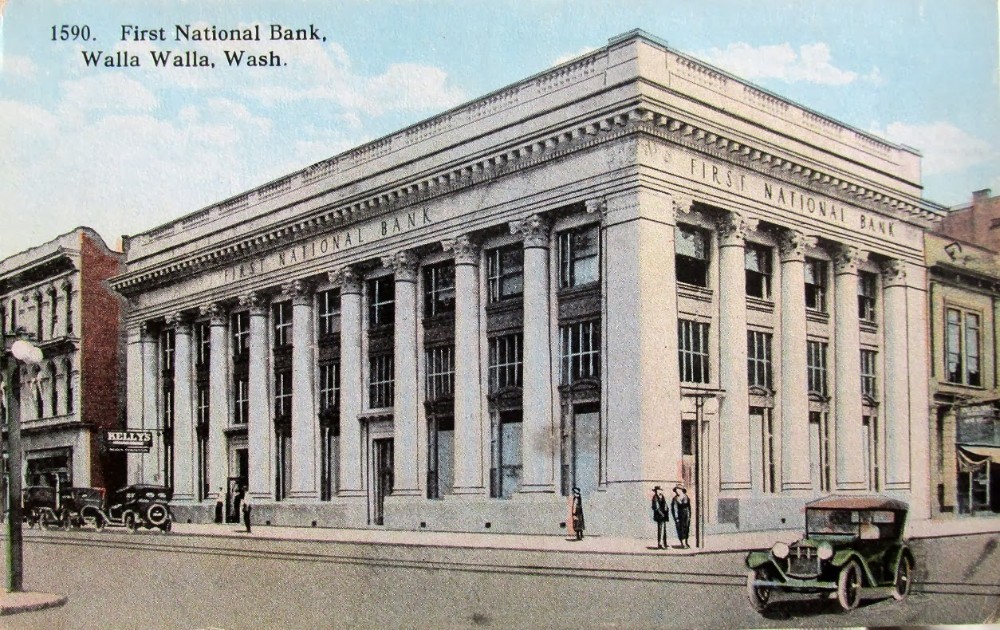The recent trouble in several regional banks serves as a reminder of where and how small banks emerged in our robust nation and how they often served as the center of life in cities, towns, and rural neighborhoods. The life and times of Levi Ankeny, 1844-1921, in Walla Walla, Washington is an example of those modest, fruitful origins.
The central quad of Whitman College in Walla Walla is called Ankeny Field. It was named for Missouri-born Levi Ankeny, founder of the first nationally chartered bank in Washington State and a former U.S. Senator.
Ankeny was educated in Portland, Oregon, then moved to Lewiston, Idaho where he served as mayor for three terms. In 1877, he and his wife Jennie Nesmith came to Walla Walla. With the help of local business he applied for a national bank charter in 1878, during the presidency of Rutherford B. Hayes. Ankeny and a partner shared duties as officers, cashiers, clerks, and custodians at the modest institution among the Palouse wheat fields. During a later, more affluent time, 1904, the Ankenys hosted a Walla Walla dinner for U.S. President Theodore Roosevelt, an occasion remembered for its hearty but simple bill-of-fare.
For over 30 years the little bank occupied a downtown space of 20 by 50 feet. Upon renewal of the bank’s charter, Levi Ankeny had demonstrated his honesty, work ethic, and diligence as an influential citizen. He reached out to help establish the first national banks of Pendleton and Baker, Oregon. He did the same for the First National Bank in Waitsburg, Washington and the Columbia National Bank of Dayton, Washington.
After serving as U.S. Senator from 1903 to 1909, he died on March 29, 1921. John Ankeny, one of his five children, became the bank’s second vice president. John, a native of Walla Walla and a graduate of Whitman College (the oldest institution of higher learning in Washington state), guided the First National Bank through a different era. Although agricultural affairs were important, new commercial enterprises had entered the picture. Also, after the 1929 stock market crash John Ankeny and his Board of Directors faced serious problems from debtors who needed refinancing.
In November of 1946, SeaFirst Bank (since absorbed by others) acquired both the First National Bank of Walla Walla and the Columbia National Bank of Dayton. The days of personal, patient Ankeny family banking came to an end. Although today’s financial institutions make a point of describing “personalized banking,” it has likely never matched the community-oriented involvement provided by the Levi Ankeny family.
Whitman College rugby and Lacrosse teams run and tumble over the turf of Ankeny Field, likely without a clue about the namesake of their playground. Levi Ankeny’s small-town life demonstrated how banking, public service, education, and family values helped move Washington state forward and upward, with a personal and local touch.
Discover more from Post Alley
Subscribe to get the latest posts sent to your email.

People rarely go into a bank anymore
Very informative. Never knew TR had visited my home town, nor that the laps I ran around the field at Whitman were named after Levi Ankeney.
Please, a follow up on Walla Walla’s still thriving “Baker – Boyer” Bank!
I believe the president of the bank is a relative of the founder
Having grown up in Walla Walla, I remember an elderly lady named Mrs. Ankeny. She must have been a daughter or granddaughter of John Ankeny because she was a local philanthropist. As I remember. My dad and uncle would really have enjoyed this article and maybe would have added something through the comments.
I actually meant daughter of granddaughter of Levi Ankeny.